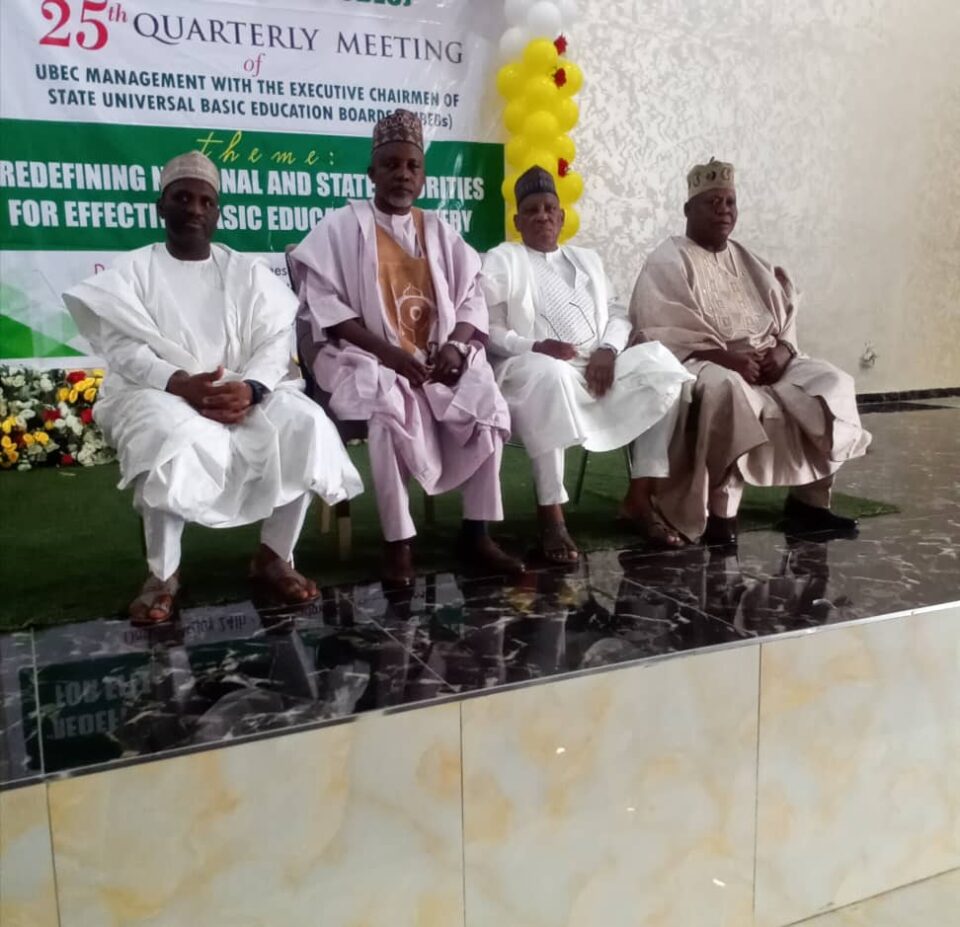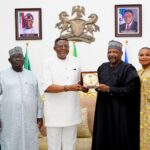By Felix Khanoba
The Federal Government has lamented that massive investments in the nation’s basic education sector have not translated into desired results.
Minister of State for Education, Dr Yusuf Sununu, made this known while declaring open the 25th quarterly meeting of Universal Basic Education Commission (UBEC) Management with the Executive Chairmen of State Universal Basic Education Boards (SUBEBs) on Tuesday in Abuja.
“The investment so far in education is extremely commendable but the output is not commensurate ; not matching the input, therefore we need to do something about that….
“It is really disheartening that despite the Federal Government huge investment, interventions and technical support, basic education sub-sector is still bedeviled with these unpleasant occurrences: learners sitting on bare floors, high rate of drop-outs, increased number of out-of-school children, poor infrastructure, dilapidated classroom buildings, inadequate learning facilities, unqualified teachers, inadequate monitoring, inequitable access and low learning outcomes which has resulted to the falling standard of education in our country.
” We cannot continue to sit on the fence and allow our educational system to continue to deteriorate, we must take the bull by the horn and delete the name of Nigeria among the “Learning Poverty” countries,” the minister said.
Speaking further on the event which had its theme as ‘Redefining National and State Priorities for Effective Basic Education Delivery”, the minister called for new strategies and collaborative efforts between the federal and state governments to address the identified problems.
“The theme is very apt because there are so many reasons we should seat down and redefine our priorities. Indices in the education (sector) are not in any way good,” the minister said.
Sununu said it is unacceptable that Nigeria parades the highest number of out-of-school children in the world as well as the highest low literacy rate, with a national average of about 60%.
The minister, however, expressed the readiness of President Bola Tinubu’s administration to transform the nation’s education sector through the Renewed Hope Agenda, adding that the Federal Government is ready to commit more funds to the sector to boost access and quality learning.
Sununu called on Chairmen of SUBEBs to review the current state of basic education in their various states by conducting needs assessment of all schools with a renewed determination to justify the Federal Government’s huge investment in the states.
“The SUBEB Chairmen must also ensure that every child in their respective state benefit from the free, universal and compulsory basic education regardless of sex, ethnic or religious backgrounds, language or status as this will reduce the incidence of out- of-school children syndrome,” he said.
On his part, the Executive Secretary of UBEC, Dr Hamid Bobboyi, called for new approaches to holistically address problems of basic education sector.
“There are emerging trends that demand new approaches in tackling them; these therefore call for new strategies. This is what informed the choice of the theme of this meeting,” Bobboyi said.
The UBEC boss also revealed that the Commission has successfully conducted the 2022 National Personnel Audit fieldwork and the assessment on learning achievements.
” You may recall that the Kano meeting was held in the middle of the 2022 National Personnel Audit fieldwork. Shortly after, data collection for the 2022 National Assessment of Learning Achievements in Basic Education (NALABE) was conducted across the country. I am glad to report that the exercises were concluded successfully.
“The reports of the two activities are at the finalization stages and they will be disseminated to the public as soon as possible,” he said.
While saying UBEC is collaborating with relevant partners to address the problems in the basic education sector, Bobboyi decried the present learning poverty in the country.
” Studies have shown that learners are graduating from primary school unable to read and write. Learning poverty is a function of many factors.
” Prominent among these are the quality of school governance, teacher quality, availability of essential teaching and learning materials, and the learning environment.
” This challenge must be addressed with the urgency that it deserves otherwise our educational system will be turning out dysfunctional citizens who are neither useful to themselves nor to their communities. It is important for us to determine where more resources should be deployed to rescue basic education, ” he said.
The Executive Secretary also harped on the need for
Nigeria to invest in digital technology-aided education.
” This is the sure path towards producing globally competitive citizens. The UBEC Smart Schools are models that states are expected to replicate.
” A phased equipping of existing schools with IT infrastructure and training of teachers should be adopted as a strategy for transforming the existing schools to smart schools.
” The Commission will continue to support the states and FCT in this endeavour, especially in the areas of e-content development and training,” he added.



